- Home
- slideshows
- miscellaneous
- I drove a $141,000 Porsche 911 4S and a $224,000 911 Turbo S - and my favorite model might surprise you
I drove a $141,000 Porsche 911 4S and a $224,000 911 Turbo S - and my favorite model might surprise you
We'll start with the 911 Carrera 4S. At $141,000 as-tested, the 4S is the top of the new 911's lower range.

The 992 iteration of the 911 looked great in a "Gentian Blue Metallic" paint job (I love blue 911s). The price was $120,600, before extras.
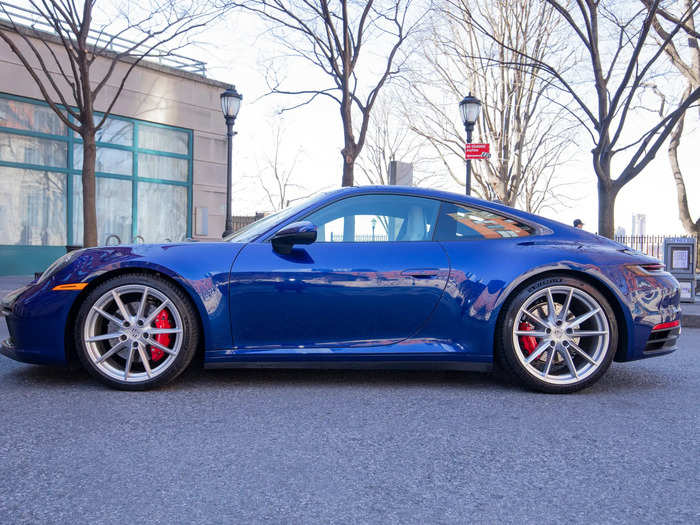
Our bug-eyed buddy grew out of the People's Car of postwar Germany — it's the snazzier older brother of the VW Beetle.
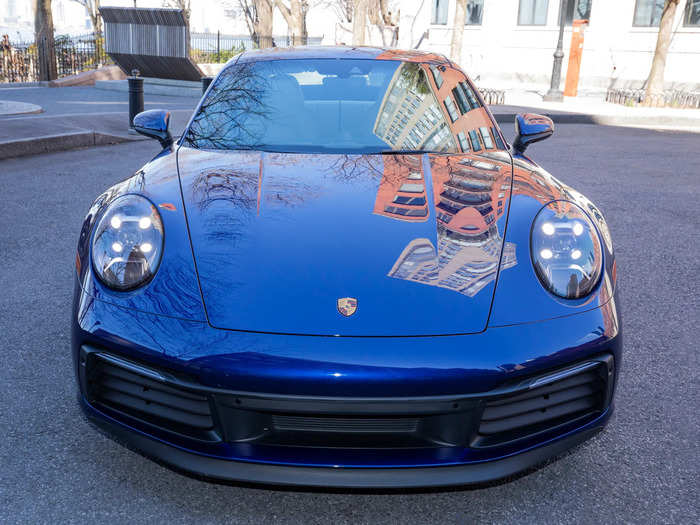
The rearing-horse badge is familiar.
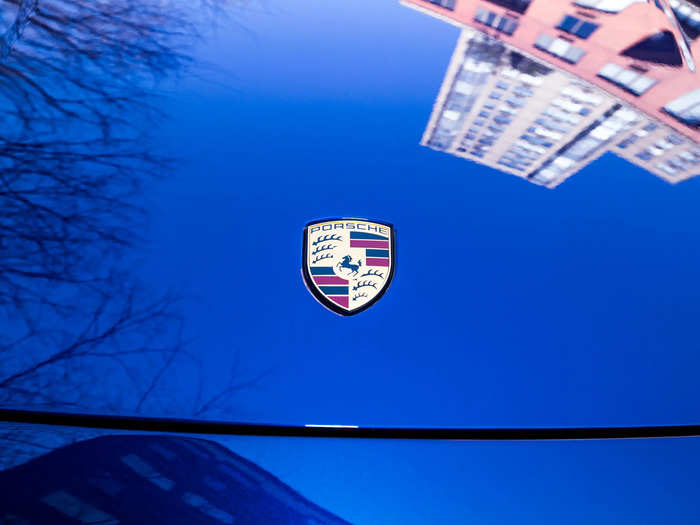
Nobody would argue that the 911 has an attractive rear end. The hump has gotten less humpy over the years. But it's still a hump.
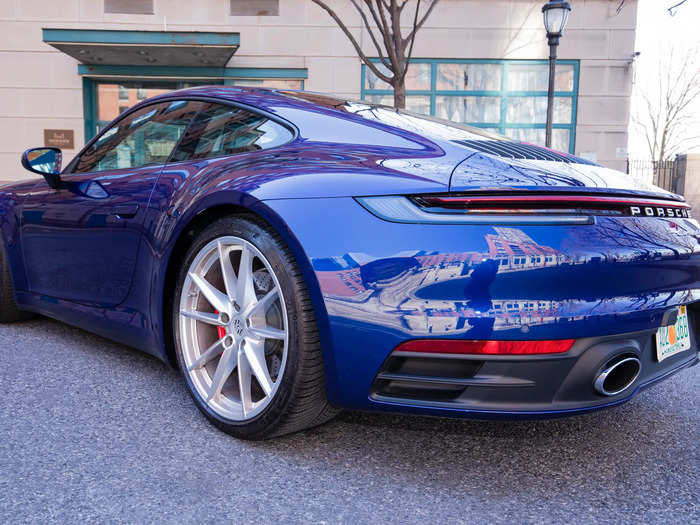
Viewed directly, it isn't so bad. Remember, the 911 has its engine and a pair of wide tires back here, requiring broad haunches. The dual-sport exhaust tips were silver-tipped in my tester. The exhaust tips you see sticking out of the rear bumper here are just decorative, though. The true exhaust ports sit farther back.
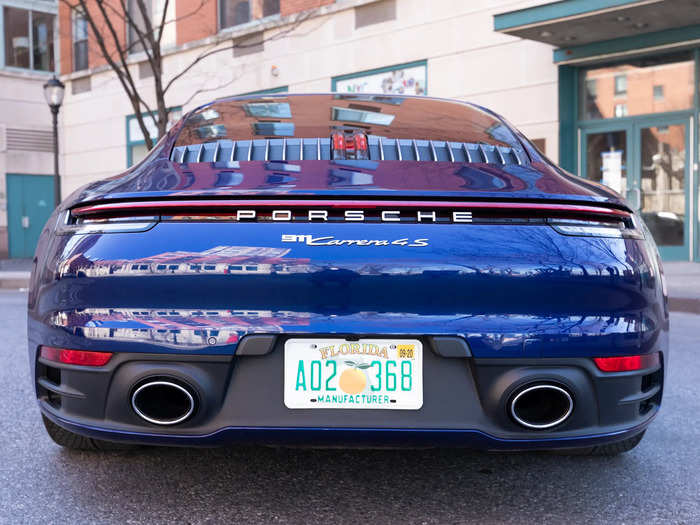
The LED headlights are quite effective for night driving ...
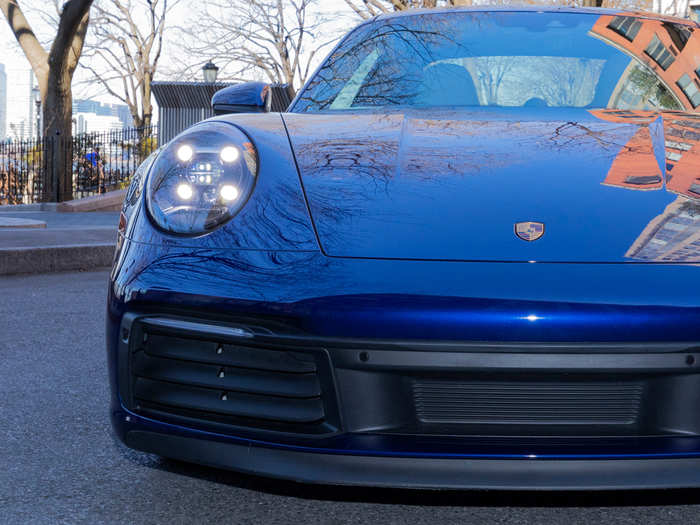
... And the four-point daytime running light feature just looks cool.
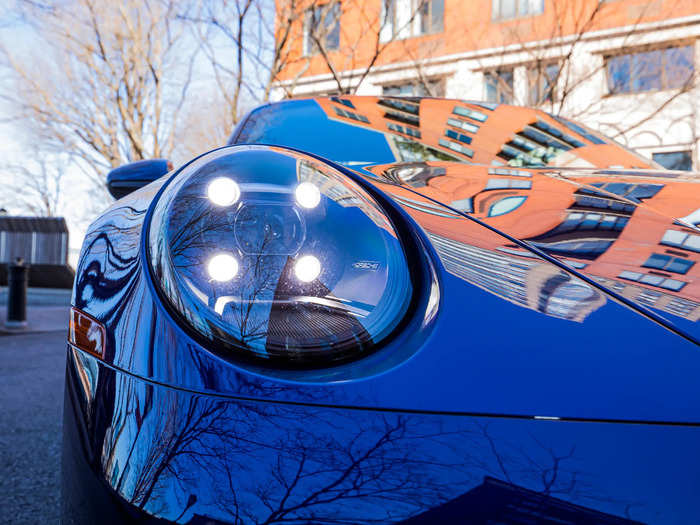
There are ventilated disc brakes and flashy red calipers front and rear. These brakes are impeccable, and they aren't even top-of-the-line. The optional carbon ceramic brakes (not seen here) offer larger discs and calipers that fill up more space behind the wheels. And they're an expensive option, unnecessary for daily street driving.
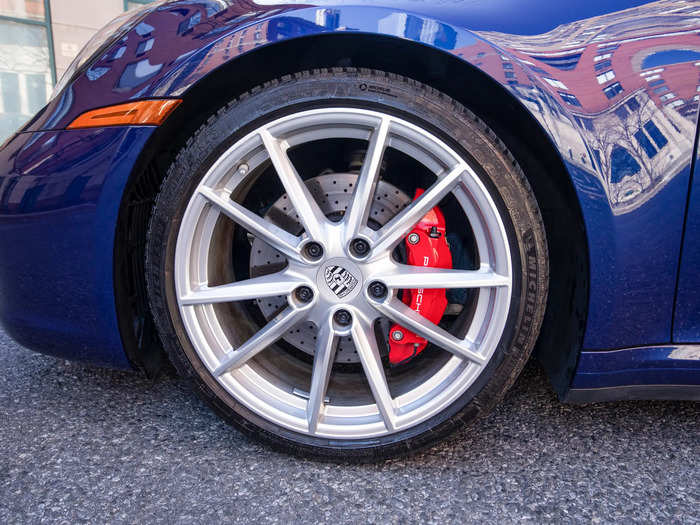
My tester rode on Michelin Pilot Alpine winter tires. Sadly, I had no snow to test them out in.
We always weep that we can't show you the engine when we review a 911. But it is under there! The rear-engine design goes back to the era before the first 911s of the early 1960s. In the 4S, it's the classic boxer six, but with twin turbochargers, making 443 horsepower with 390 pound-feet of torque.
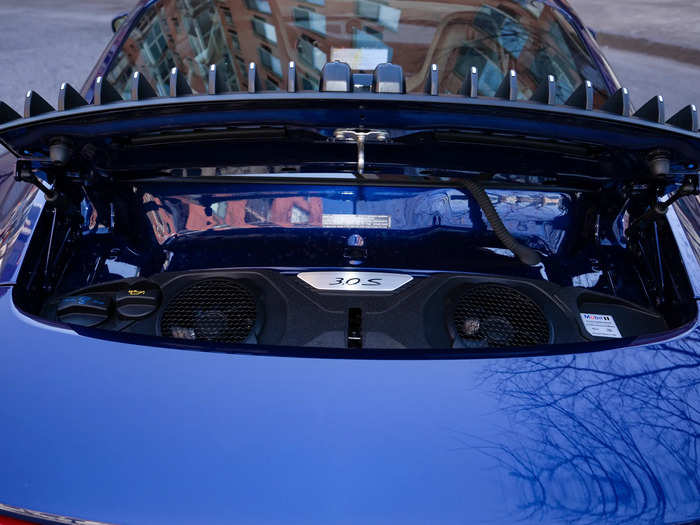
Fuel economy is exceptionally not good: 18 mpg city/23 highway/20 combined, according to the EPA. But I went through a tank rather quickly, while engaged in spirited driving. And even in mellow highway driving, you're still making use of the Porsche's passing power, which is bottomless and missile-like, so my sense was that 20 mpg, while plausible, is unlikely for most owners. And you're definitely going to want to gas up on premium fuel.
The power is piped through an eight-speed dual-clutch transmission to the superb all-wheel-drive system, which biases the rear rubber until it senses a need to move the traction around to counter slip and keep the car stable on the road.
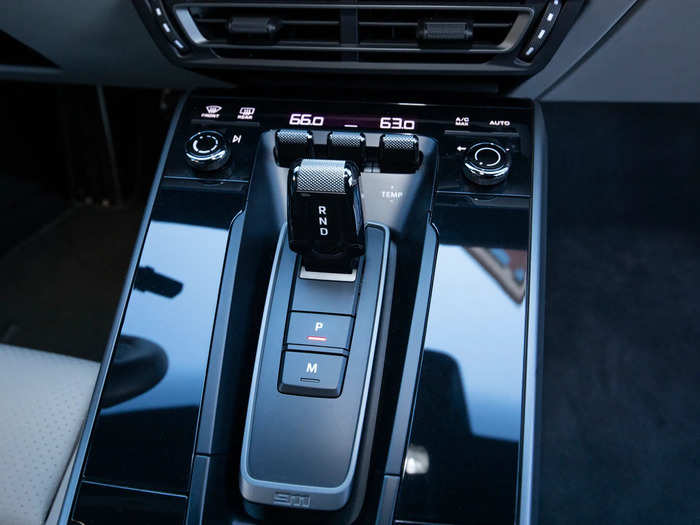
The frunk. It's small. But I was able to cram a few days worth of groceries in.
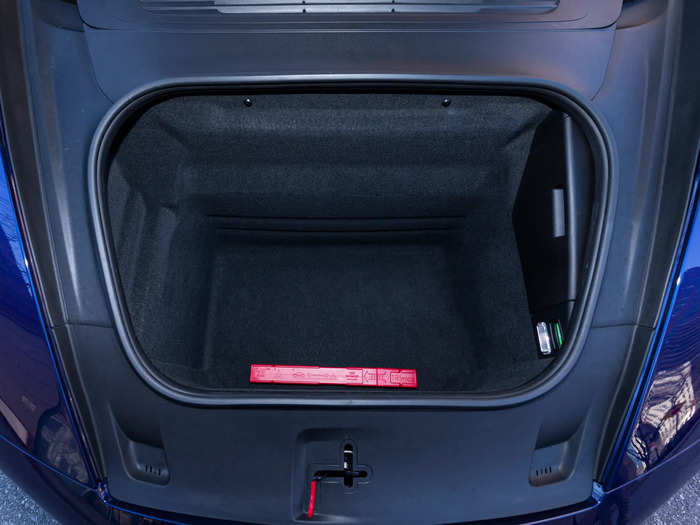
Let's step inside. Just so you know, the new 911 has "self-presenting" door handles, which are sort of annoying. And it's pretty snug in there! My test car had "Slate Gray/Chalk" leather interior that was easy to love.
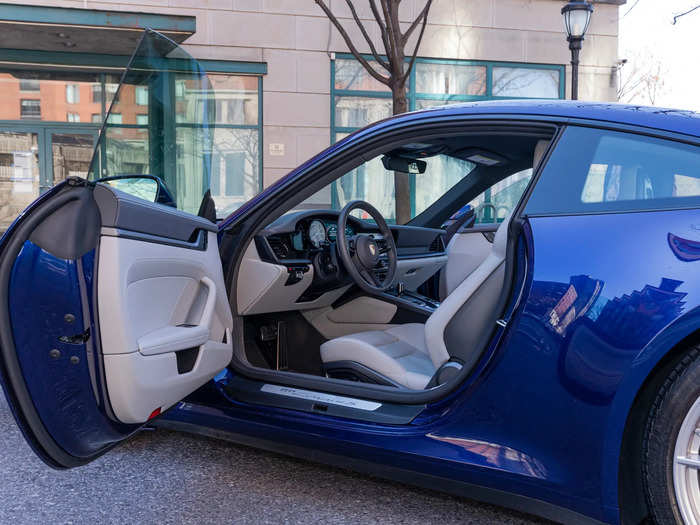
Yes! The 911's infamously terrible cupholder! It pops out, at the far right of the dash.
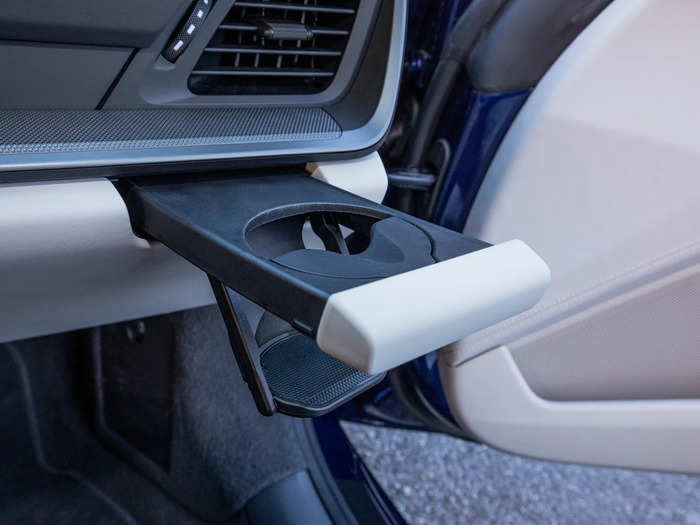
The back seat of the 911 has been a running joke for decades. It's a good place to stash an expensive leather jacket and some driving gloves, maybe a camera.
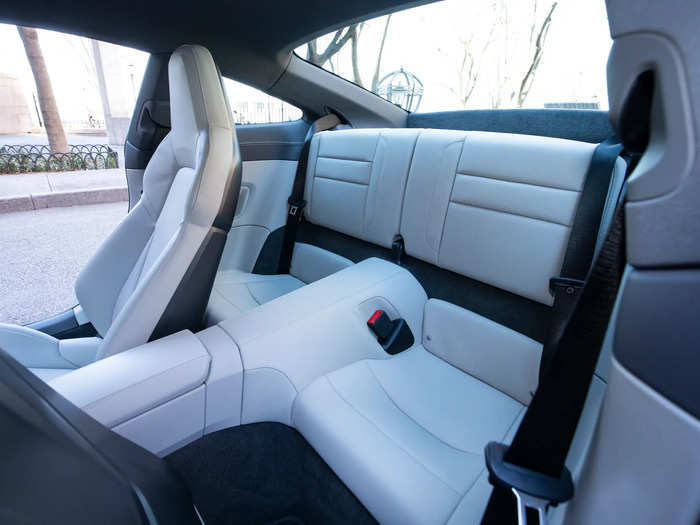
For the driver, this is where the fun happens.
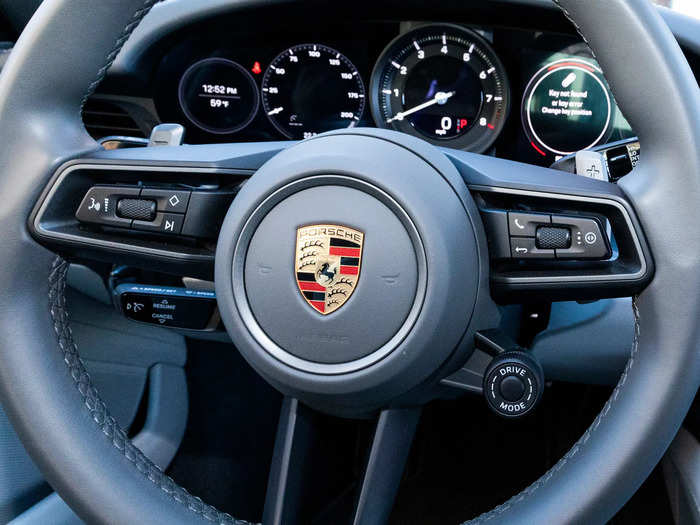
Drive modes are selected using the knob on the right side. Punch the center button and you get 20 seconds of screaming over-boosted turbo oomph. It does slightly warp time in practice.
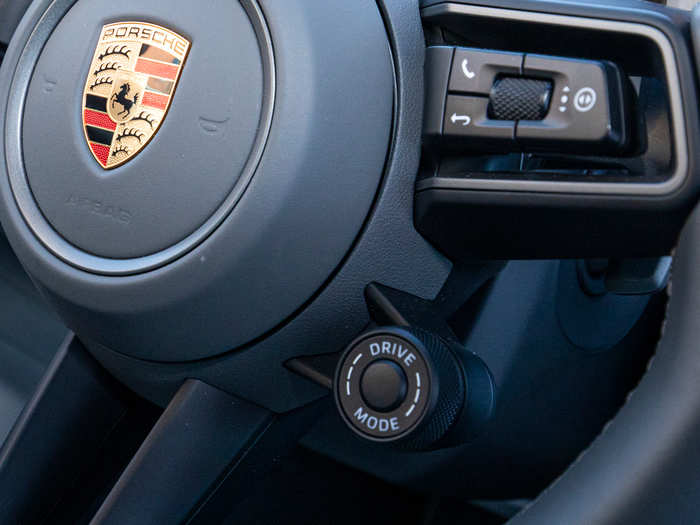
The 911 4S has Ordinary, Sport, Sport-Plus, and Individual modes. Most of the time, I was in Sport. I used Sport-Plus for 0-60 mph runs, and I fooled around with Individual, which allows for customization of suspension, steering, and throttle.
In Sport-Plus, the shifts are really held back, letting you taste the 7,500rpm redline. But it's harder to drive the car on civilian roads in this mode, and for me, it was more difficult to concentrate on the 911's handling. But, the engine burbles from the fully-opened exhaust ports are maximized in Sport-Plus.
It's a Porsche, so the tachometer is front and center. The screen to the right can be customized using a controller on the steering wheel.
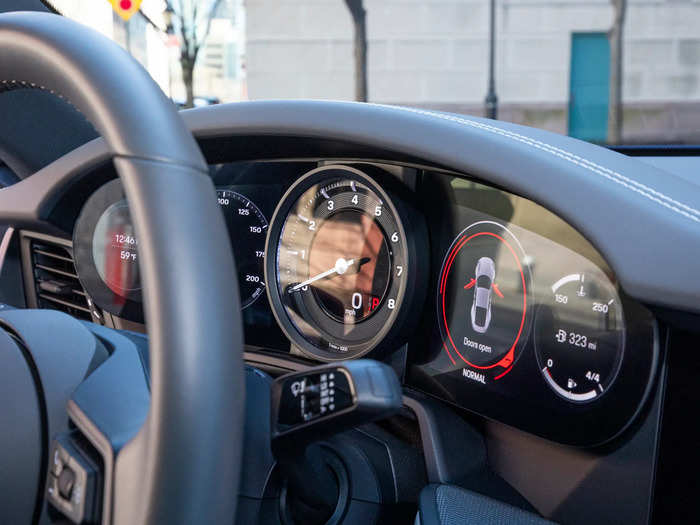
The Porsche infotainment system runs off a central touchscreen.
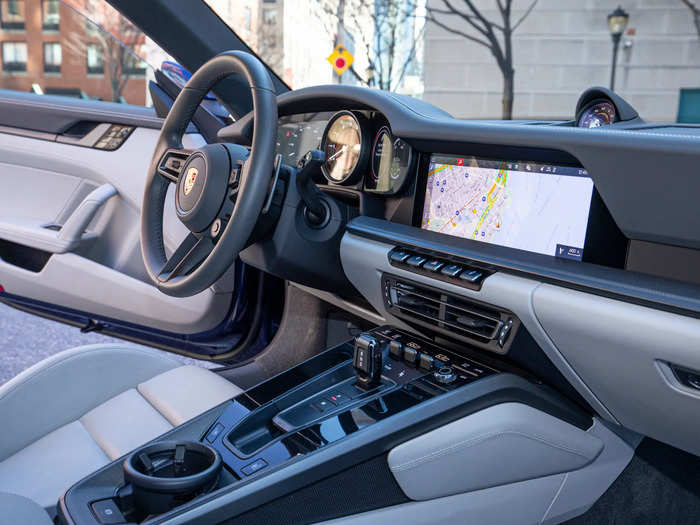
If you've driven an older 911, having the equivalent of a small TV in the middle of the dash is jarring. But the system is bright, sharply rendered, and the interaction is snappy. Navigation was excellent. You have a host of media options, from SiriusXM satellite radio to Bluetooth connectivity and USB input.
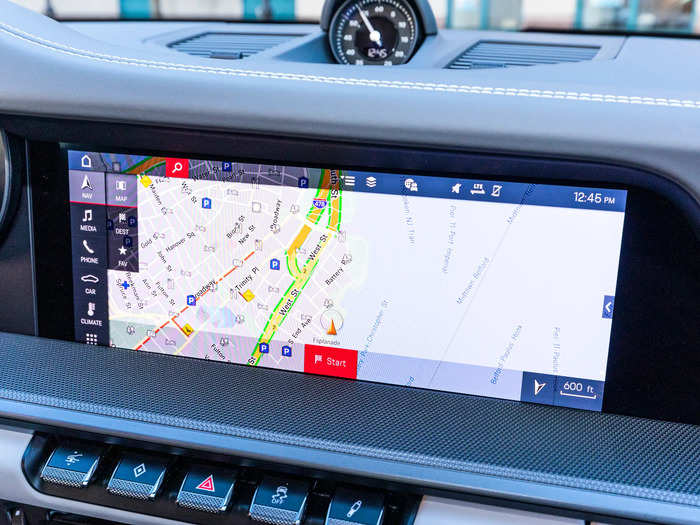
So what's the verdict on the 911 Carrera 4S?
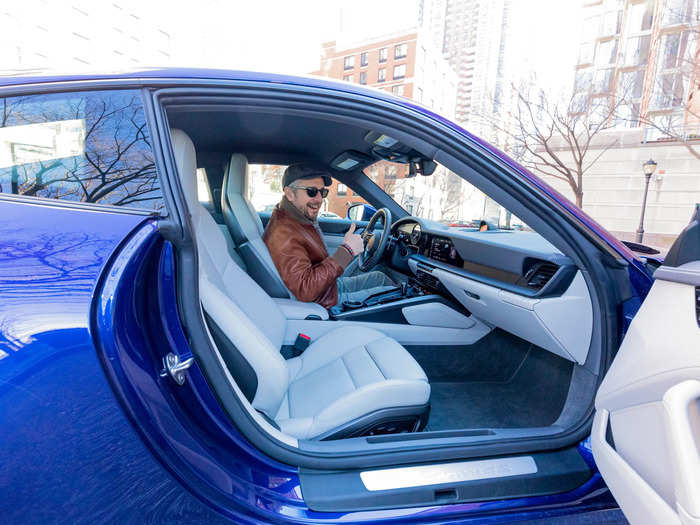
In my review, I wrote, "It's perfect."
Let me elaborate.
By "perfect," I mean there's never been a better Porsche 911. When I first drove an all-wheel-drive 911, I thought it was like cheating. I enjoy a slightly tail-happy sports car, but I don't relish the experience of counter-steering my way out of slides when I'm throttling a powerful machine.
I already knew the 911 4S was good. Real good. No news there. What amazed me this time around was how Porsche somehow made it even better. This, folks, is stunning. They keep finding ways to improve perfection. Incredible. Spend the money, buy the car. Buy the best. Don't look back.
On to the Porsche 911 Turbo S. It's $224,000 worth of glorious-ness from Stuttgart, in a blue metallic paint job. Base price before extras was about $204,000. My tester was a European-spec 911, hence the license plate.
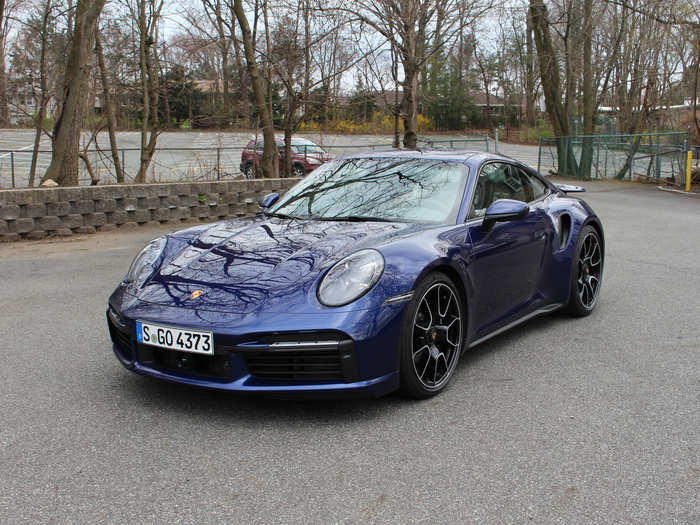
If the 911 4S is the top of the lower tier, then the Turbo S is the top of the top tier. It's basically more of everything, from prow to stern.
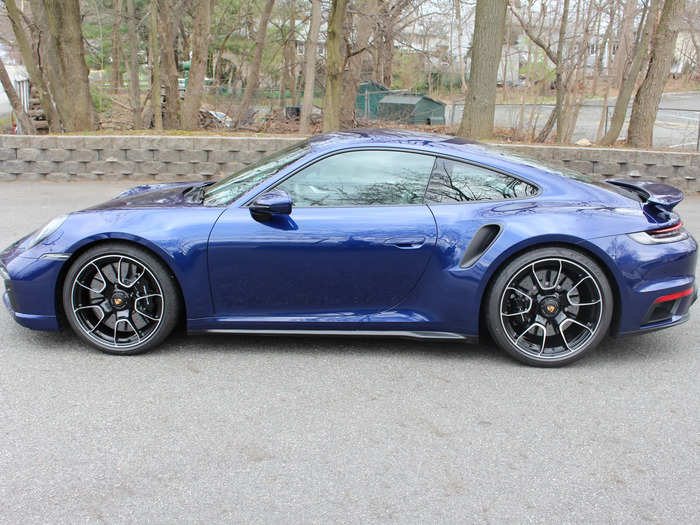
The 911's unmistakable design has been more or less unchanged since the early 1960s. Over the decades, however, the styling has become sleeker and more aggressive.
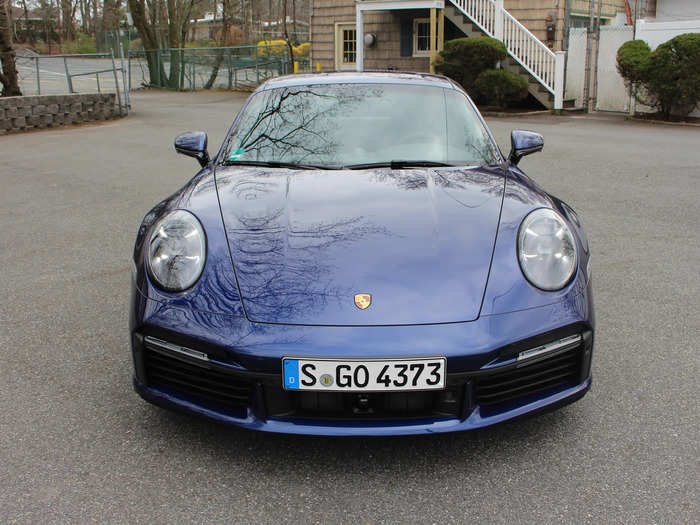
The Turbo S has a variable front spoiler lip and active cooling vents. In all, the car has been engineered to make maximum use of the torrents it generates from its impressive speed.
The badge is ... exactly the same as the 4S's.
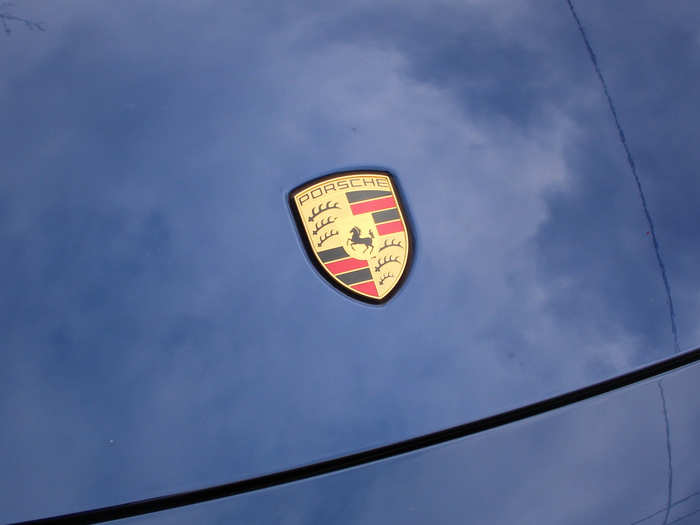
The rear end is also effectively the same.
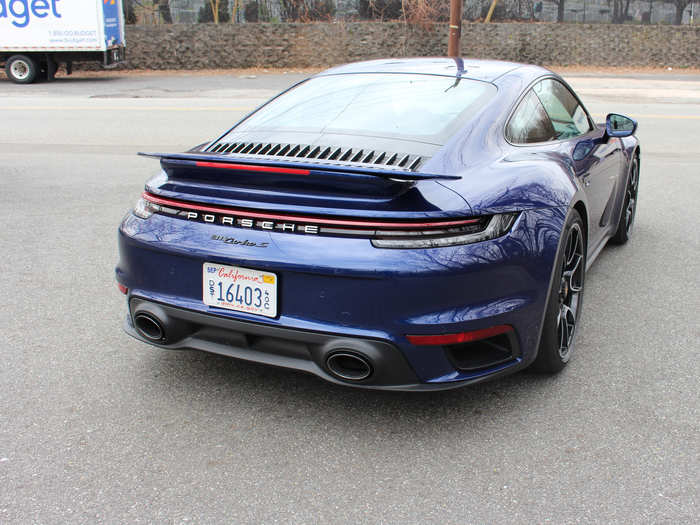
But there is that wing! It's a high-tech wing that can adjust to better manage the dynamic airflow over the vehicle, enhancing downforce.
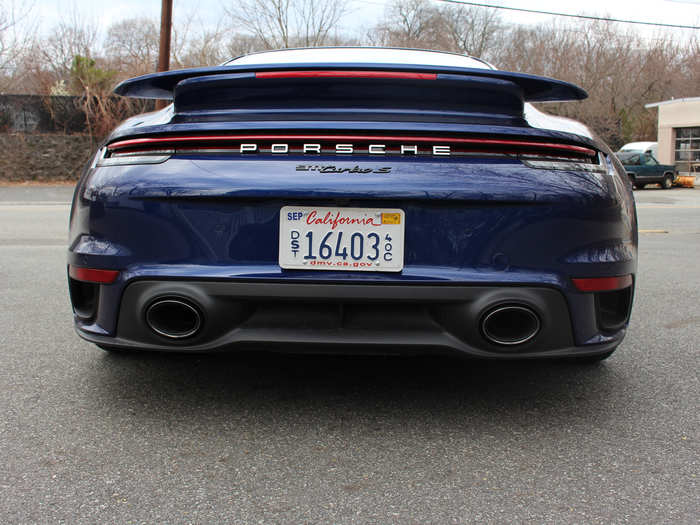
The headlights are called "LED Matrix" units.
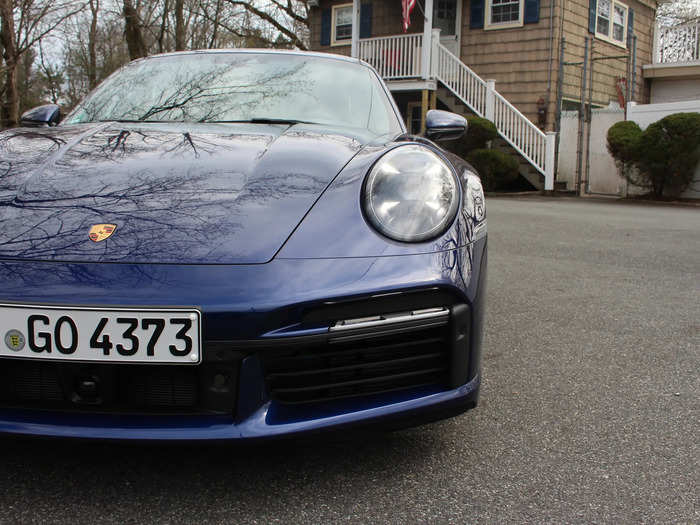
They have a super-cool four-point running-light configuration. At night, they provide breathtaking illumination. (My tester also had a $2,400 night-vision feature as an option.)
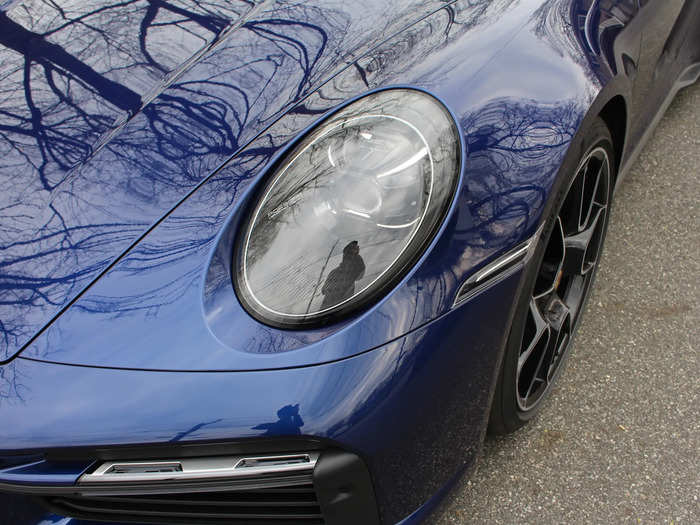
Up front, we have 20-inch wheels, with 10-piston aluminum calipers and vented discs — a serious upgrade from the 911 4S's brakes. Out back, we have 21-inch wheels, with 4-piston calipers and vented discs. The rubber for my tester was a sticky set of Pirelli P Zeroes.
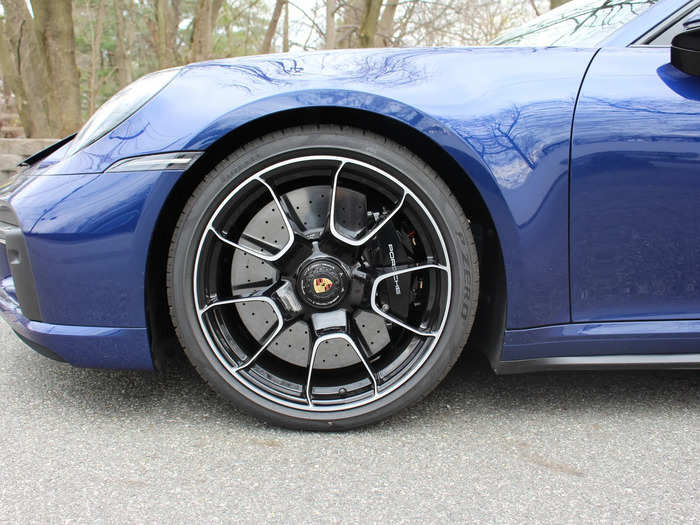
An incredibly potent 640-horsepower, twin-turbocharged 3.8-liter flat-six lives under the engine hatch, making 590 pound-feet of torque. Both numbers are significant increases on the previous-generation Turbo S: 60 more horses and 37 more pound-feet. That makes this 992 Turbo S the most powerful 911 ever.

The power is sent to the Turbo S's all-wheel-drive system through an eight-speed dual clutch transmission. The shifter is a bit tricky to get used to. There's also a manual mode, with paddle shifters behind the steering wheel.

The Turbo S shares the wee frunk of the 4S.

The slate-gray leather interior is rather minimalist for a car this expensive. Other tones are limited to brushed metal and piano-black surfaces, as well as some Alcantara.

The worst cupholder in the automotive world appears again in the Turbo S.

The cramped back seat is also no different from the 4S's.

The driver's cockpit is similar to the 4S's. But the overall quality of the switchgear in the Turbo S is superior.

Drive modes are Normal, Sport, Sport-Plus, and Individual. Punch the center button and you get a timed boost — but the max turbo output in the Turbo S is now available at all times, not just when the boost is activated.

The combination digital-analog instrument cluster should be familiar to any Porsche enthusiast. The right side is a customizable screen.

Infotainment runs off a central touchscreen that's bright and responsive. In my limited time with the Turbo S, I had no issues. The infotainment system offers Bluetooth pairing, USB device connectivity, and navigation.

In the 911 hierarchy, the Turbo S is the top dog, sitting atop the Carrera and GTS ranges. The $200,000-plus price tag is daunting, but for the most serious drivers, the Turbo and Turbo S are the pinnacle of Porsche-ness.

The insanely stable 4S comes off as downright tossable by comparison with the Turbo S. You are, in a word, stuck to the pavement in the Turbo S, despite the wail of the boxer six behind you and persistent sense that there must be somehow, some way to get the rear tires to surrender adhesion. But no, the grip is endless.
It's much too much for daily life. But if you want to be impressed, impressed, impressed — stunned, even, into stupefied admiration — then the 2020 Porsche 911 Turbo S is your chariot.
So which of these glorious machines is my favorite? I'd have to go with the 911 Carrera 4S.

I definitely prefer the 911 Carrera 4S, but that's no knock on the Turbo S (or for the matter the regular Turbo).
The upshot is that I can savor more of what the 4S has to offer, while the Turbo S outruns my abilities and outruns them fast.
The 4S is really fast, with a 0-60 mph time that I clocked at about three seconds and a top speed of 190 mph. But the Turbo S is staggering: o-60 mph in 2.6 seconds, according to Porsche, and possibly 2.5, according to me. The top speed is 205 mph, but passing the legal speed limit, however briefly, might make you think you've bent time.
More than $80,000 separated the 4S and the Turbo S, as tested. If you can justify the difference, then be my guest and go for the Turbo S. But if I were writing the check, I'd choose the 4S and live very, very happily ever after.
Popular Right Now
Popular Keywords
Advertisement